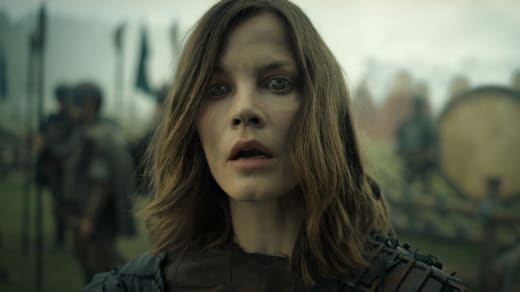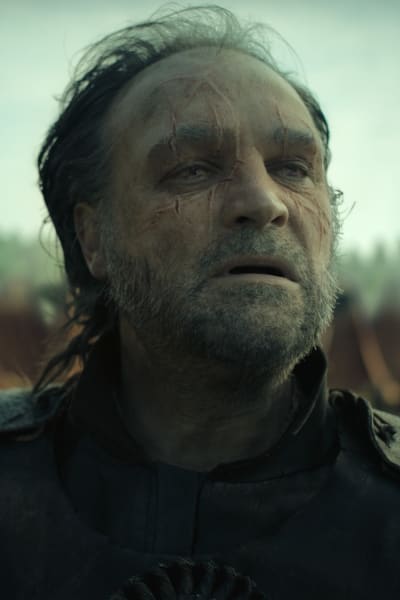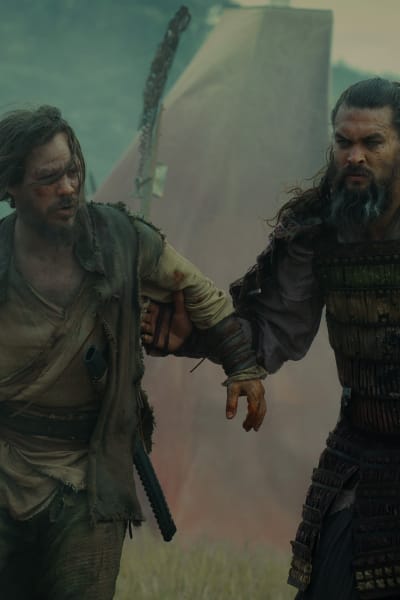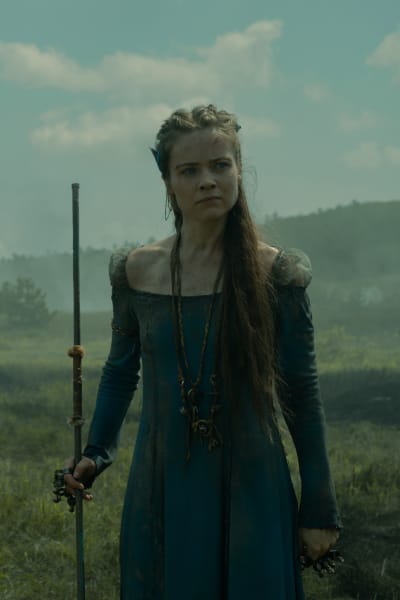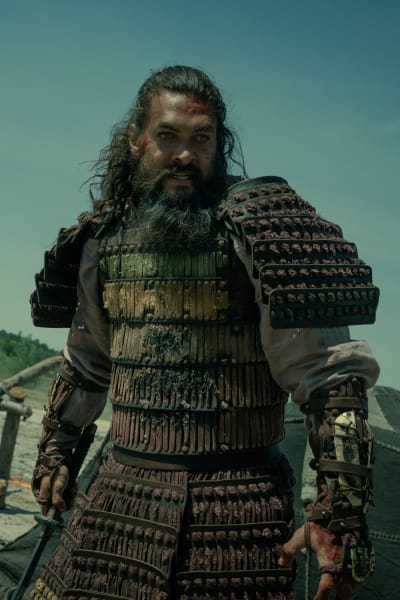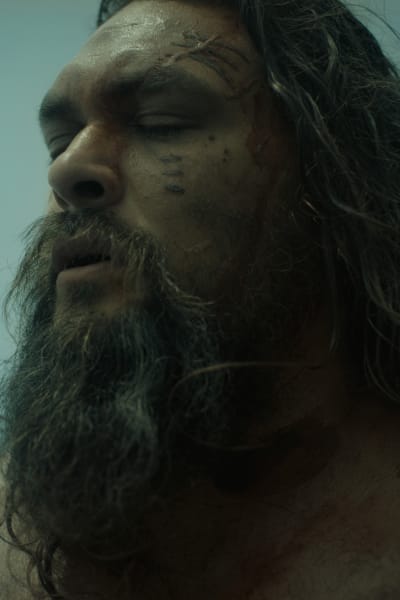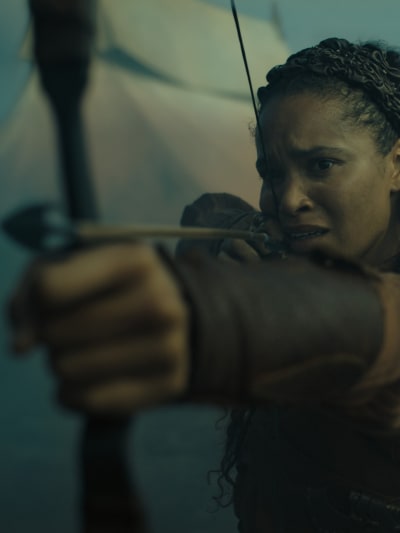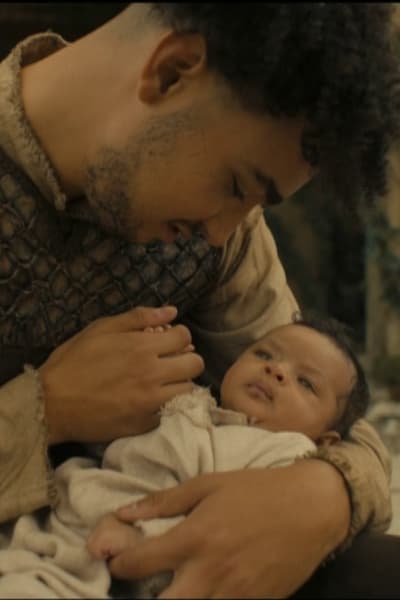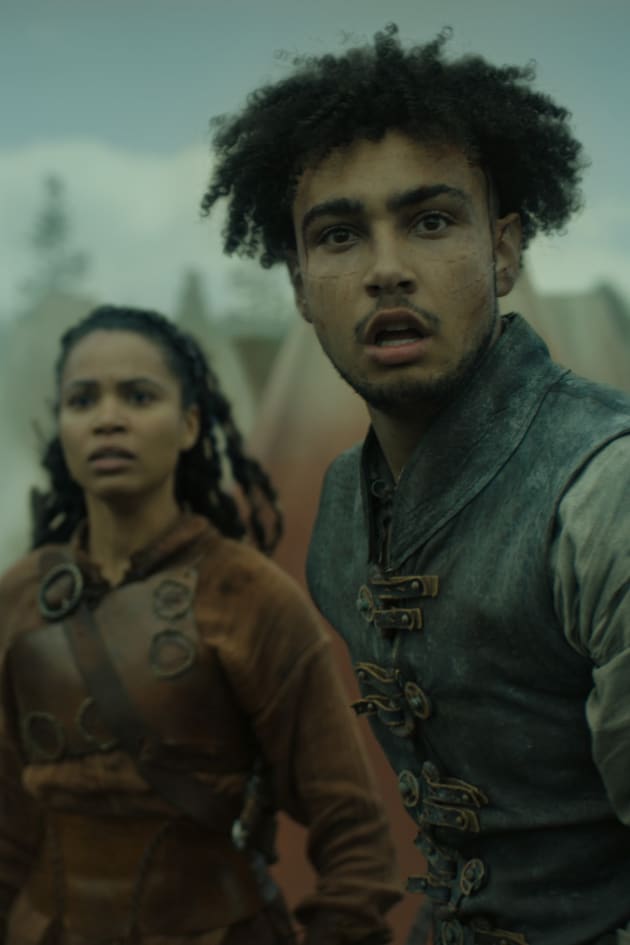
Chet! Chet!
This was one, if there ever was, a befitting, emotional, and poetic series finale. See Season 3 Episode 8 concludes one of the most well-thought out and ingenious premises to ever grace television.
We have enjoyed, cried, angered, and laughed while watching this saga that has unfolded on our screens for three years. This series finale was one for the books. Many decisions were made, some we might disagree with, but it is what it is. Strap in as we explore all this.
Most of us wanted to see a great battle and were not disappointed. Anders Engstrom directed all the episodes in this season, and it is evident in the final product that he did an outstanding job. From well-choreographed action scenes to emotional ones, hats off to him.
After consummating their union, Tomarda and Sibeth are closer than ever. This raises her confidence a notch if she could be more confident.
Confidence is Sibeth’s greatest shortcoming. Or, let’s say, overconfidence. She is overconfident in herself, her gods, and her soldiers. Despite Tormada trying to be the voice of reason and show her the many ways things could go wrong, she unceremoniously dismisses his concerns.
The realization that the Payans are not above ground rattles her. So far, she had convinced herself that this war had already been won. In that moment of panic, she decides to level Pennsa, not caring whether anything is left standing or if there will be people left for her to rule.
Tormada: My queen!
Sibeth: You called for me.
Tormada: Tell her what you hear.
Soldier: Nothing.
Sibeth: Nothing?
Soldier: No voices. No tools. No sizzle of pans or fires in the pits. No babies crying. Just the muffled sounds of many feet.
Baba and Ranger’s missions had already revealed themselves as they infiltrated the camp.
For Baba, Sibeth is his top priority, and for Ranger, Tormada is his biggest concern. This time it was all war out, so the only outcome they would have been satisfied with was death for these two.
A major realization that Maghra comes to is that: Sibeth will never leave them alone even if they make it out of the tunnel alive — which was highly unlikely.
Sibeth’s death was the most unsatisfying thing in the whole episode. See, here is what would have made me happy.
I would have loved to see her beaten to the point of death, and just before she dies, she gets tied to the back of a horse with a rope and dragged on bare ground.
This scene would have ended with her being burned at stake — like she has done to so many people — and finally strapped on top of her bombs. Each should go off one by one, blowing each piece left until there is no piece left.
Half of what I described is impossible, but imagination is free.
In this battle, everyone brought their a-game, even Kofun. His swordsmanship skills are decent. Haniwa did a spectacular job with the arrows, effectively buying Baba enough time and leeway to get to the bombs. Maghra and her huge ass weapon were also welcome addition. We cannot forget Tamacti Jun.
Tormada’s death was satisfying. Remember that saying: live by the sword and die by the sword? Well, he was the personification of this. Being blown up by his grenade was poetic, if nothing else.
Ranger got his revenge. He was prepared to go with him. And if he didn’t die, Ranger made sure to carve his eye out.
Tormada had already ordered the bombs to keep flying as the battle continued. Pennsa was taking a huge hit. With Tormada and Sibeth killed, the only threat remaining was the bombs.
Baba focused his attention on them. When he tells Haniwa to watch his six, she can hear in his voice that he is determined, and not even her concerns would deter him.
Like many of you, I was not satisfied with Baba’s death. A lot of whys ran through my mind. Why couldn’t they use something else to detonate the bombs? Why not just kill the soldiers and leave the bombs for later?
However, upon careful consideration, things couldn’t have gone differently.
As long as these bombs were on earth, Pennsa will not be safe. There were no guarantees that another mad idiot would not reverse engineer them. It was not guaranteed that these same bombs would not be used to attack Paya again.
As Baba stood on the cart carrying the bombs, soldiers closed in on him. Even if he had somehow managed to get off it, they would have overpowered him, killed him, and made away with the bombs.
Baba detonating the bombs and effectively killing himself was his final sacrifice to protect Maghra, Haniwa, Kofun, and Wolffe.
As far as he is concerned, there is no sacrifice he can’t make. As he promised many years ago, he would never let any harm come to Sibeth and their children. This was him keeping the promise.
His death was one of those defining moments in people’s lives where everything is categorized as before and after him. The happiest those who knew him have ever been was during his lifetime. They might find happiness later on, but something will always be missing.
After Baba’s death, life must go on.
I loved this concerning this finale. It tied everything together. If some creators made this, they would have left it at this point, leaving a huge question that overshadows the show’s legacy. Many conflicts were resolved.
Baba Voss was Maghra’s once-in-a-lifetime love. After he died, she sure must miss him. The children, too, must miss him. Baba’s departure was different because they didn’t have a body to bury. There is no grave to weep at, which is why Maghra visits his death scene.
Your children feel your absence every bit as much as I do. But their futures, the ones you gave your life to ensure, stretch out before them with infinite promise.
Maghra
Haniwa and Wren marrying was one of the best moments. Even in all the loss and uncertainty that clouds their future, they make time for love, as it is one of the most beautiful things in life. As two sighted life companions, they will do great things for their kind.
The problem of sight was not easily resolved, if it ever was. I’m inclined to side with Haniwa on this. One of the most useless things people do is to fight change. Change is the only sure thing in life.
The sighted are here. It is no use to genocide them as they will be more naturally from unsighted people. One can never eliminate them.
They also have a considerable advantage as they can easily navigate the world. Demonizing them to the masses won’t work. Sooner or later, people will see that they are just like everyone else, and it’s game over.
The only way is to accept them and make an effort to integrate them into the wider society.
Nevla: We’ve all just borne witness to the destructive power of vision. It is the position of the Trivantian people that vision simply poses too much of a risk to all of us.
Maghra: I understand your position. But it was not vision that built Tormada’s bombs, but Tormada’s cruel exploitation of sighted children that accessed the knowledge of the ancients. And it is that destructive knowledge, not vision itself, that needs to be outlawed.
Kofun has the special skill of uniting warring people together. Even without a firm resolve on the sighted, he initiates the first steps toward peace. As he might find out, it will be a long journey, but he is willing to take it.
There is no doubt that he will make a great king after his mother is gone.
His final sacrifice is to his people and his son. If he truly is to understand them and for them to accept him, the sight will be a huge barrier. His giving up his sight might seem stupid and short-sighted, but it does make sense.
There isn’t much to see in this world. Whatever little there is to see, he has seen it. He is not interested in learning about the knowledge of his ancestors. Sight doesn’t serve him. It makes him different from his subjects and his son. Getting rid of that difference is a sacrifice worth making for him.
It is a decision I wouldn’t make, but I understand.
I can’t fully serve the people or my son if my sense of the world is different from theirs. I’m saying, I think I’ve seen enough. I want to live in the same world as my son. I want to hear, feel, smell what he does.
Kofun
Haniwa has always found it unfair how the sighted are treated. Charlotte’s visit with a map from her sister was the out she needed. She has a solid moral compass and can be trusted with the ancestors’ knowledge.
She wants a world where this knowledge is used to help humanity. Leaving her family behind in the pursuit of this is a sacrifice worth making.
On this, I’m on her side. Finding other sighted people is the first step in rebuilding the world and hopefully avoiding some of the ancestors’ mistakes.
This was one of the best series finales that I have ever seen. It resolved all the existing conflicts but left the story a bit open for a potential movie or spin-off.
See is one of the earliest Apple TV+ originals, and its end is significant.
This was a show ahead of its time. The premise was a great one, and it was well executed. It hurt my head obsessing over why it has never been nominated for an award. The directing, writing, costumes, and music was stellar.
From the sweeping score of the opening sequence to the immersive battle music, Bear McCreary did a great job with it, like many works of his.
This show is a gift to those who saw and will see it. I will miss these characters. They have taught us some valuable lessons.
Baba has taught us courage and dedication; Kofun has taught us loyalty; Haniwa has taught us open-mindedness and fierceness. They all have taught us about family and sacrifice.
Even Sibeth, I will miss. Her antics and fearlessness were always entertaining to watch. If we have learned anything from her, we must be wary of leaders who seek to exploit our differences for their gains.
They would use religion to oppress and deny people their natural rights. They hold no allegiances but to themselves.
All good things must come to an end, and everyone must die.
For me, it’s been a pleasure. What about you?
Chet! Chet!
Denis Kimathi is a staff writer for TV Fanatic. Follow him on Twitter.

